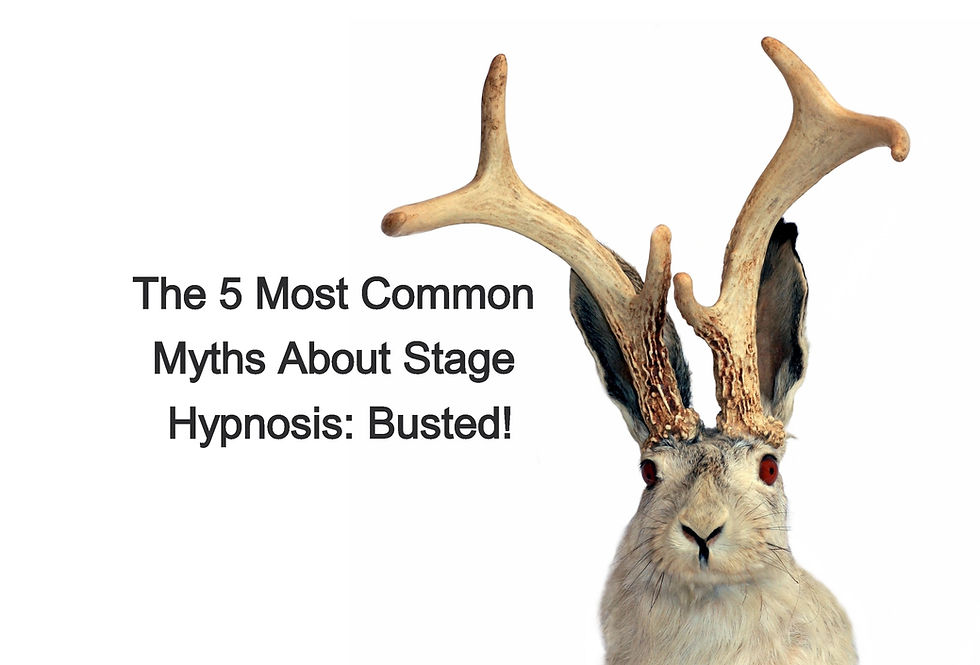The Science Behind Stage Hypnosis
- Chris Minor
- Mar 14, 2023
- 4 min read
The science of stage hypnosis have been shrouded in controversy and misunderstanding for many years. While hypnosis itself has been practiced for millenia, only within the last 200 years have researchers started to unravel the mechanisms behind hypnosis. If you've been interested in stage hypnosis you won't want to miss this article on The Science of Stage Hypnosis!
CONTENTS:
What Exactly is Stage Hypnosis and What is the Difference Between Other Forms of Hypnosis?
Most people when they think of hypnosis will likely be familiar with one of two types of hypnosis; stage hypnosis and hypnotherapy. Unlike hypnotherapy (therapeutic hypnosis), which is used to help individuals overcome particular psychological issues, stage hypnosis is used to entertain and engage audiences.
Both stage hypnosis and hypnotherapy utilize the mental state often referred to as trance or somnambulism to give hypnotized individuals suggestions; however that is about as far as the similarities go. While hypnotherapy uses suggestions to create resources and change belief systems, stage hypnosis uses suggestions that play into larger skits to create situations and outcomes that range from funny to awe-inspiring for the audience's entertainment. The process of stage hypnosis typically involves several stages which build upon one another.
The Induction Phase
The first stage of the hypnotic process is called the induction phase. This is where the hypnotist will work to put the individuals in the audience into a state of hypnosis. Most hypnotists will use relaxation and focus as a theme for this phase. This can be achieved through a variety of different ways, the most common being progressive muscle relaxation and guided imagery techniques.
The Suggestion Phase
The second stage is called the suggestion phase. Here the hypnotist provides suggestions to the individuals while they are in the hypnotic trance. These suggestions are often times well thought out and given very specifically to the individual to create the desired response for maximum effect. In the case of stage hypnosis, maximum effect being funny, over-the-top, and overly emphasized for the best audience reactions.
The Post-Hypnotic Phase
The third stage is often referred to as the post-hypnotic phase or closing phase. This is where the individuals are brought out of the hypnotic trance. During this phase, the hypnotist will often give positive suggestions and/or give individuals a final suggestion to be acted upon after awakening.
The Science
While the exact mechanisms behind hypnosis are not yet fully understood, researchers have made significant breakthroughs in understanding how hypnosis affects the brain. For instance, hypnosis activates the same brain areas that are involved in meditation, concentration, and focused attention. Hypnosis can also positively affect the brain's networking, which is responsible for introspection and self-reflection.
Not surprising that several studies have shown hypnosis to have a wide range of positive effects on individuals, including but not limited to; reducing pain, anxiety, and stress. Hypnotherapy has also been used to treat a variety of medical conditions, such as chronic pain, irritable bowel syndrome, insomnia and more. (source)
It is important to note that the science of stage hypnosis is still a matter of debate among scientists and medical professionals. One question still being heavily debated on is; why some individuals may be highly suggestible and respond well to stage hypnosis and others may not be as receptive to the suggestions provided by the hypnotist.
Additionally, the entertainment aspect of stage hypnosis can make it difficult to separate fact from fiction. Some people may believe that the hypnotized individuals are faking their behavior for the sake of the show, while others may believe that the individuals are genuinely under the hypnotist's control. Yet more fascinating topics best reserved for their own articles!
Positive Benefits of Stage Hypnosis
Participating in a stage hypnosis show brings with it many positive benefits. Overall feelings of well-being and restfulness have been well documented by individuals after a stage hypnosis show for as long as hypnosis has been around. While a bit more rare, some individuals have found themselves to be more outgoing afterwards, in several cases overcoming shyness and fears of public speaking! I have personally had many people tell me about unintended positive benefits they experienced during and after shows. So many that I very quickly understood that hypnosis itself has no negative side effects, only positive benefits.
Considerations
It is important to note that stage hypnosis is not a form of mind control. Nor are the individuals who participate in a stage hypnosis vulnerable to manipulation during, or after a show. Stage hypnosis works by tapping into the suggestibility of the volunteers by creating an atmosphere of trust and openness.
It is also important to note that stage hypnosis shows are not a substitute for traditional medical treatments. Stage hypnosis shows should only be used for entertainment purposes and not for therapeutic purposes. Moreover, it is important to note that not everyone is a good candidate to participate in a stage hypnosis show. Individuals who are experiencing certain mental health conditions, such as psychosis, or dissociative disorders should consider checking with their doctor before volunteering for a stage hypnosis show. Despite the ongoing debate on the science of stage hypnosis, it is clear that stage hypnosis can alter people's behaviors and perceptions in many ways. It has been used for entertainment as well as in therapeutic contexts. For this and many other reasons, only professionally trained and experienced hypnotists should ever attempt to hypnotize another individual.
Conclusion
The science behind stage hypnosis is a complex and fascinating subject. While researchers have made significant progress in understanding how hypnosis works and affects the brain, there is still so very much that is not fully understood. That said, the potential applications of hypnosis in medical and therapeutic contexts make stage hypnosis an integral part in exposing the public to the power of their minds!








Comments